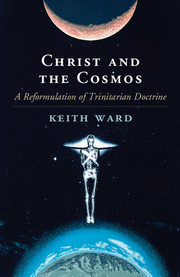Book contents
- Frontmatter
- Contents
- Preface
- Acknowledgements
- PART I THE THREEFOLD NATURE OF THE DIVINE BEING
- PART II THE BIBLICAL SOURCES OF TRINITARIAN THOUGHT
- PART III THE TRINITY, IMMANENT AND ECONOMIC
- 11 Why Three?
- 12 The Trinity and Revelation
- 13 Hegel and Modern Theology
- 14 The Immanent Trinity
- 15 The Identity of the Immanent and the Economic Trinity
- 16 Hegel Again
- 17 What Creation Adds to the Trinity
- 18 The Epistemic Priority of the Economic Trinity
- 19 The Trinity and Naive Realism
- 20 The Trinity and the Cosmos
- 21 Revelation and the Immanent Trinity
- PART IV THE SOCIAL TRINITY
- PART V THE COSMIC TRINITY
- Bibliography
- Subject Index
- Name Index
16 - Hegel Again
from PART III - THE TRINITY, IMMANENT AND ECONOMIC
Published online by Cambridge University Press: 05 September 2015
- Frontmatter
- Contents
- Preface
- Acknowledgements
- PART I THE THREEFOLD NATURE OF THE DIVINE BEING
- PART II THE BIBLICAL SOURCES OF TRINITARIAN THOUGHT
- PART III THE TRINITY, IMMANENT AND ECONOMIC
- 11 Why Three?
- 12 The Trinity and Revelation
- 13 Hegel and Modern Theology
- 14 The Immanent Trinity
- 15 The Identity of the Immanent and the Economic Trinity
- 16 Hegel Again
- 17 What Creation Adds to the Trinity
- 18 The Epistemic Priority of the Economic Trinity
- 19 The Trinity and Naive Realism
- 20 The Trinity and the Cosmos
- 21 Revelation and the Immanent Trinity
- PART IV THE SOCIAL TRINITY
- PART V THE COSMIC TRINITY
- Bibliography
- Subject Index
- Name Index
Summary
As with Barth, it is instructive to compare Rahner's view with Hegel's picture of ‘being-in-itself ’, which comes to knowledge of itself by objectifying itself as ‘being-for-itself ’ and then unites this objectified being to its primal origin, thus fulfilling in time its eternally complete being as ‘being-in-and-for-itself ’. Hegel took the doctrine of a threefold God and transmuted it into a grand picture of the whole of reality as the story of Absolute Spirit progressively coming to know and love itself in and through the history of the world. Rahner seems to be taking the Hegelian world picture and compressing it back into its Biblical origins as the story of one man who uniquely expresses being-itself, and one Church which uniquely appropriates and mediates the divine love as seen in Jesus.
The picture is not, in Rahner, compressed in such a way that the rest, the non-Christian part, of humanity is excluded from ‘the self-communication of God to man’ which ‘must present itself to man as a self-communication of absolute truth and absolute love’ (Rahner, 1979, p. 93). One might say that, for Hegel, the whole history of humanity expresses the Absolute. For Rahner, history is largely the story of human failures and aberrations. God must appear in history as a self-sacrificial redeemer, as one preserved by grace from moral evil, as in one sense truly human and yet as uniquely exceptional, as one fully united to God by a unique act of divine power. For Hegel, at least on some interpretations of his difficult writings, each individual person is a moment in the self-expression of the Absolute. For Rahner, individual persons are free and responsible, and are invited to share in eternal life without losing their separate identity. They must freely accept the divine love they are offered, and so there must be a community, founded on God's self-revelation in Jesus, which mediates that offer to people in many different places and at many times. Absolute truth and love may be definitively revealed through one community (or set of communities), but the revelation is precisely that such truth and love are universal.
- Type
- Chapter
- Information
- Christ and the CosmosA Reformulation of Trinitarian Doctrine, pp. 111 - 115Publisher: Cambridge University PressPrint publication year: 2015



